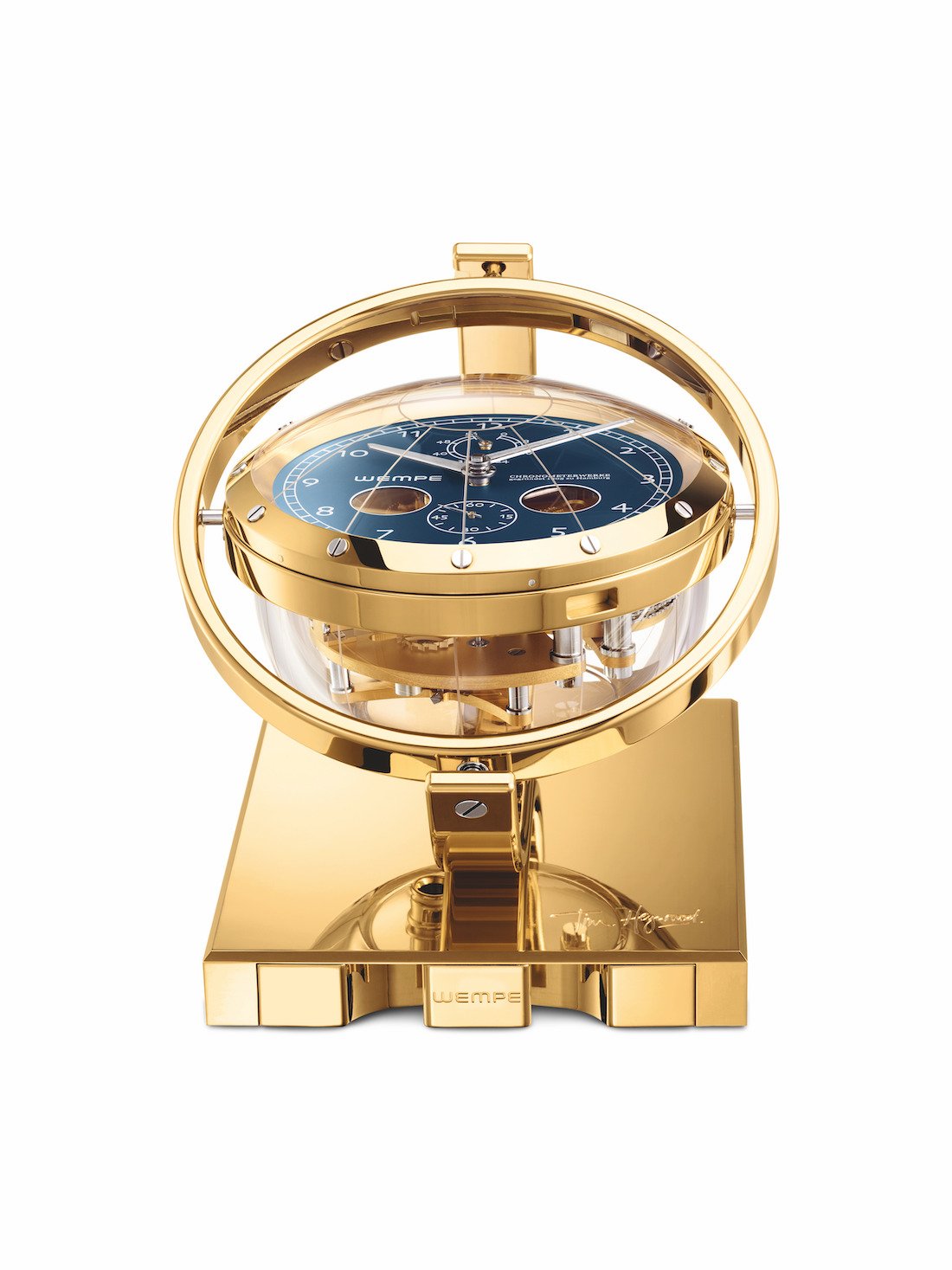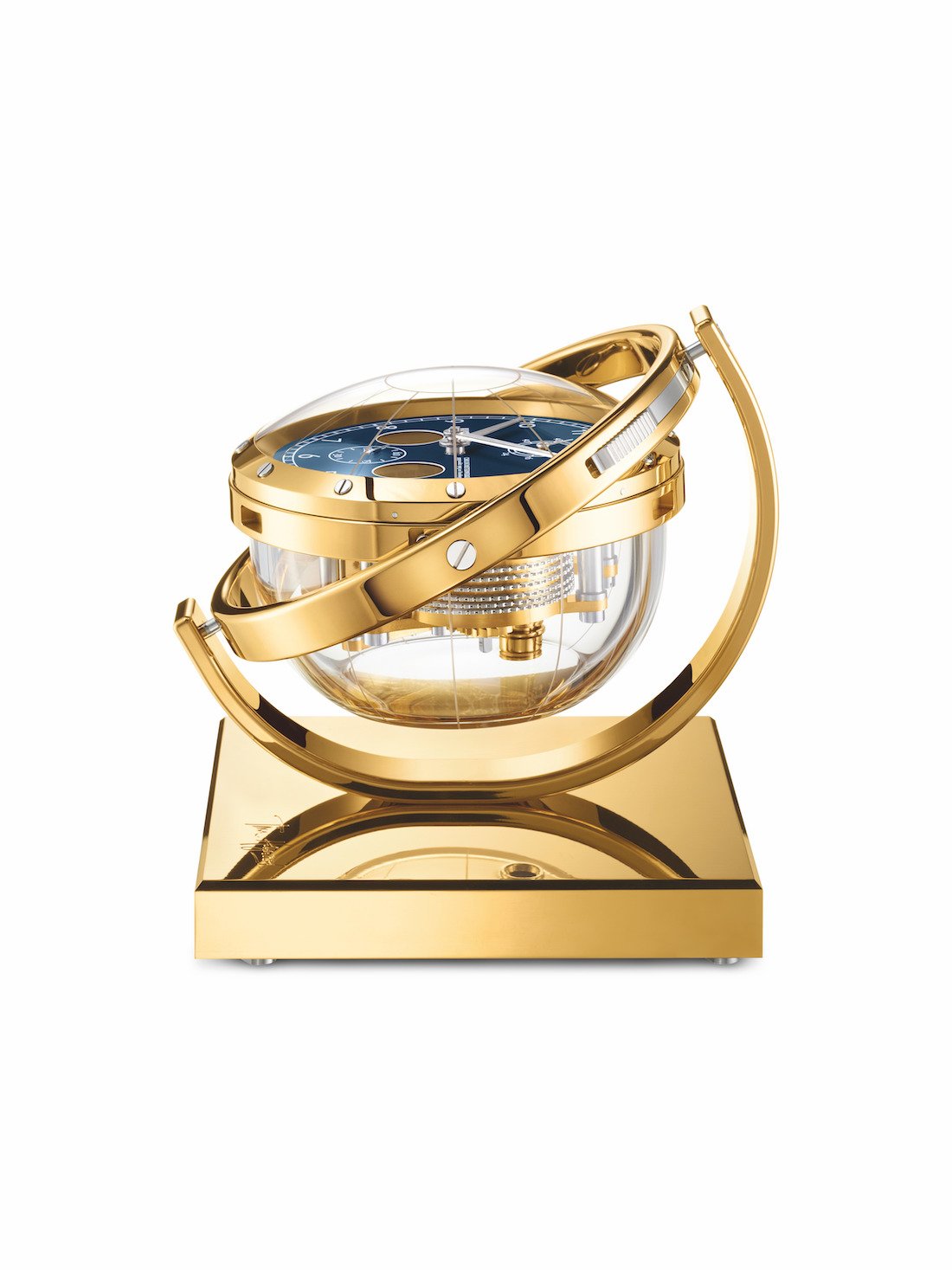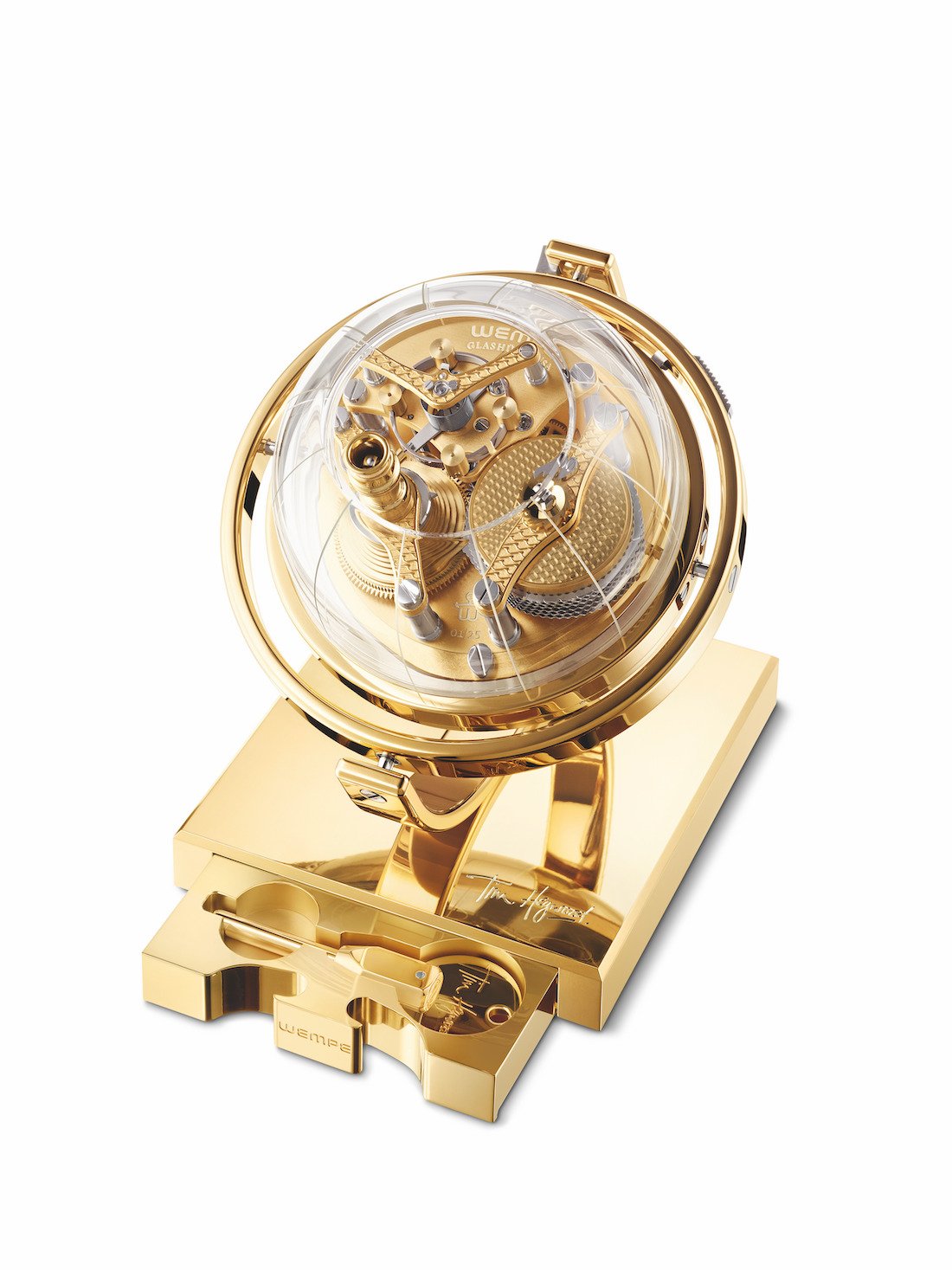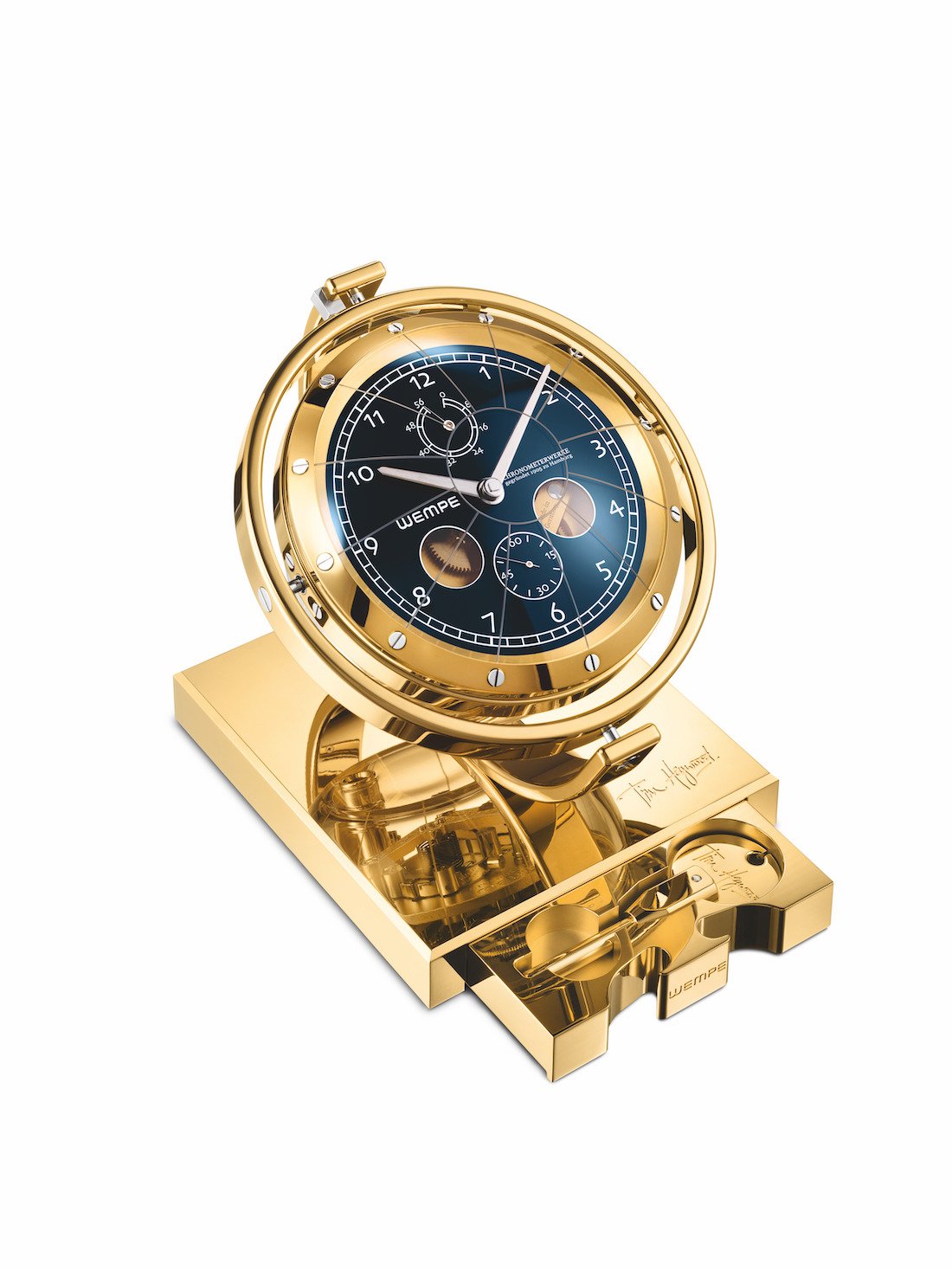The production of marine chronometers is part of Wempe’s watchmaking tradition. Since 1905, the company has equipped seagoing vessels with these special timepieces, whose great precision is unaffected by rough seas and ever-changing temperatures. Wempe’s “unified chronometer,” housed in a classic case, has been manufactured for the last 80 years. In the latest edition, Wempe now brings nautical tradition and state-of-the-art yacht design together thanks to renowned British ship designer Tim Heywood, who has created striking new marine chronometers available mid-February 2023.
The Wempe name is synonymous with fine timepieces and jewelry. This family-owned company, which is based in Hamburg and was founded in 1878, is headed by Kim-Eva Wempe and has 32 branches in cities all over the world, including New York, Paris, and London. The company has been closely connected for generations with renowned watch manufacture in Switzerland and Germany. Wempe produces its own Glashütte i/SA brand wristwatch chronometers in Glashütte, Saxony, and its own By Kim brand jewelry in Schwäbisch Gmünd. In addition, Wempe operates the largest independent watch workshop in Europe and has been certified as a “Best Place to Learn” in Germany since 2015.
Tim Heywood is fascinated by the history of marine chronometers, whose introduction in the 18th century enabled safe navigation at sea through the precise determination of longitude — which, among other things, formed the basis for long-distance travel and worldwide trade. The marine chronometer’s seemingly simple functionality is based upon its ability to steadfastly indicate the precise time at its home port. Underway, the ship’s crew can see any deviation from noon as precisely set and measured while in port and use this information to calculate the vessel’s position. However, such timepieces are hard to design and construct, and it took centuries to perfect them.
Today, the word “chronometer” is used to describe a precise timepiece that must prove its accuracy in a test center specifically designed for chronometer testing. Wempe maintains one of these test centers in Glashütte’s former observatory, where the company has also been building marine chronometers since 2010.
The basic movement of the unified chronometer —Type 05— has proven itself for decades thanks to continuous improvement. For the current Type 06 chronometer movement, every component was redesigned and adapted to cutting-edge manufacturing techniques implemented between 2017 and 2021. This is a major reason for the chronometer’s maximum rate variation of only 0.3 seconds per day while maintaining 56 hours of power reserve. This extraordinary precision is also due to the elaborate chain-and-fusée assembly that ensures that the energy supplied to the gear train by the mainspring as it unwinds always remains constant. The energy is transmitted via an intricate chain that slowly unwinds from a cone called the fusée.
Gimballed within a cube of fine wood and featuring traditional typography against a light-colored dial, the CW80 0017 chronometer can be found in the collections of all Wempe showrooms worldwide.
Bernhard Stoll, CEO of Wempe’s watch division, says, “The purchasers of these timepieces also appreciate the historical instrument look because it represents the highest level of precision.”
The elaborately decorated Type 07 three-bridge movement represents a new generation of technology. Here, each part of the movement was recalculated in Wempe’s workshops; for the balance wheel, for example, the engineers opted for a classic bimetallic construction, albeit with a galvanic coating. The Type 07 manufacture movement can be found in two chronometer models designed by world-famous yacht designer Tim Heywood, who combines watchmaking heritage with modern composition. Over the past several decades, in which Heywood has created a distinctive look for mega yachts, his process has involved developing a comprehensive overall concept.
Designing a single piece of equipment, like that which Wempe asked him to do, was unusual, but Heywood approached the task the same way he does for his major projects: He wanted to be proud of the final result. A particular challenge inherent in the design of marine chronometers is the fact that they have to fit into very different environments; Heywood has certainly mastered this challenge.
“The chronometers look as good on traditional boats as they do on a modern yacht — and they fit in with the owner’s country home as well as his city apartment,” he says.
Heywood has equipped the new chronometers with a bold blue dial featuring state-of-the-art typography, while two openings at 4 and 8 o’clock respectively provide glimpses of the movement. The borosilicate glass on the dial side is cut from a solid block. Radiating out from the center are twelve meridians —the first chronometers were created in order to determine exactly these imaginary time boundaries— which continue on the wide, curved glass found on the back. The gimbal of the gold-plated brass case looks much like an abstract sculpture when the timepiece is wound with the movement facing upward.
Designer Tim Heywood’s goal was for the chronometer to remind its owner of the wealth of nautical traditions regardless of the current location. The dark brown case, which can be ceremonially opened using its three folding doors, contributes to this. The solid corpus is created by laser sintering at Metrica, another specialist in individualized yacht fittings. The case includes a gold-plated time zone map in the lid as well as sixteen coats of varnishing and hand polishing to give the “Cube” a deep glow and make it seaworthy. This chronometer will be available starting from mid-February 2023 at a price of $57,460.
The British designer is known for the soft organic lines of his designs invoking feminine shapes. He points out that ships are, after all, the only objects referred to using feminine pronouns in the English language. However, there is also another reason why Heywood chose the feminine curves of the exotic Coco de Mer nut after which to model this limited chronometer edition of 50 pieces: The humble coconut variation can traverse enormous distances at sea unscathed, making it a perfect symbol for marine chronometry.
The triple-doored case of the Coco de Mer is also manufactured by Metrica using laser sintering. The top of its lid is coated with bronze while the inside boasts a gold leaf. Sixteen layers of varnish are manually applied to the body, which is then polished by hand. This marine chronometer is limited to 50 numbered pieces and will be available from mid-February 2023.
Sticker Price $57,460 USD for the Cube and $91,825 USD for the Coco de Mer. For more info on Wempe click here.




























